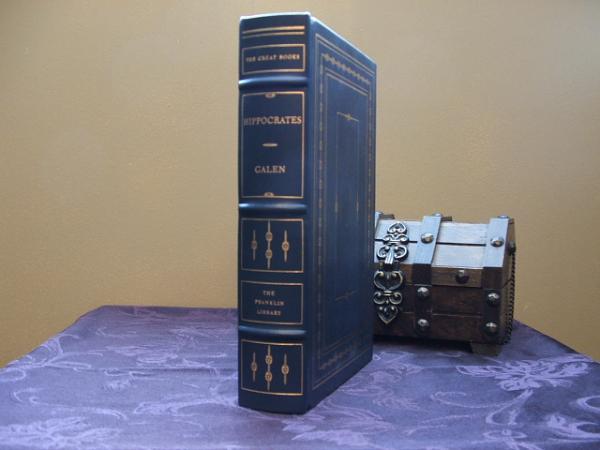Franklin Library Galen books
The Works of Galen and Hippocrates - Great Books of the Western World - 1979
Galen biography
Galen of Pergamum (129–?199/216), physician to the court of the emperor Marcus Aurelius, was a philosopher, scientist, and medical historian, a theoretician and practitioner, who wrote forcefully and prolifically on an astonishing range of subjects and whose impact on later eras rivaled that of Aristotle. Galen synthesized the entirety of Greek medicine as a basis for his own doctrines and practice, which comprehensively embraced theory, practical knowledge, experiment, logic, and a deep understanding of human life and society. Arguably the most accomplished of all medical researchers of antiquity, Galen contributed greatly to the understanding of numerous scientific disciplines, including anatomy, physiology, pathology, pharmacology, and neurology, as well as philosophy and logic.
The son of Aelius Nicon, a wealthy architect with scholarly interests, Galen received a comprehensive education that prepared him for a successful career as a physician and philosopher. He traveled extensively, exposing himself to a wide variety of medical theories and discoveries before settling in Rome, where he served prominent members of Roman society and eventually was given the position of personal physician to several emperors.
Galen's understanding of anatomy and medicine was principally influenced by the then-current theory of humorism, as advanced by many ancient Greek physicians such as Hippocrates. His theories dominated and influenced Western medical science for more than 1,300 years. His anatomical reports, based mainly on dissection of monkeys, especially the Barbary Macaque, and pigs, remained uncontested until 1543, when printed descriptions and illustrations of human dissections were published in the seminal work De humani corporis fabrica by Andreas Vesalius where Galen's physiological theory was accommodated to these new observations. Galen's theory of the physiology of the circulatory system endured until 1628, when William Harvey published his treatise entitled De motu cordis, in which he established that blood circulates, with the heart acting as a pump. Medical students continued to study Galen's writings until well into the 19th century. Galen conducted many nerve ligation experiments that supported the theory, which is still accepted today, that the brain controls all the motions of the muscles by means of the cranial and peripheral nervous systems.
Galen saw himself as both a physician and a philosopher, as he wrote in his treatise entitled That the Best Physician is also a Philosopher. Galen was very interested in the debate between the rationalist and empiricist medical sects, and his use of direct observation, dissection and vivisection represents a complex middle ground between the extremes of those two viewpoints. Many of his works have been preserved and/or translated from the original Greek, although many were destroyed and some credited to him are believed to be spurious. Although there is some debate over the date of his death, he was no younger than seventy when he died.
Method of Medicine, a systematic and comprehensive account of the principles of treating injury and disease and one of Galen's greatest and most influential works. Enlivening the detailed case studies are many theoretical and polemical discussions, acute social commentary, and personal reflections.
His treatise Hygiene, also known as "On the Preservation of Health" (De sanitate tuenda), was written during one of Galen's most prolific periods (170-180) and ranks among his most important and influential works, providing a comprehensive account of the practice of preventive medicine that still has relevance today.
Thrasybulus explores the theoretical question of whether hygiene is part of medicine or gymnastics, and in so doing delineates the interrelated roles of doctors and physical therapists. On Exercise with a Small Ball strenuously advocates that activity's superiority to all other forms of exercise.

Comments
Post a Comment
Share your best book review and recommendation